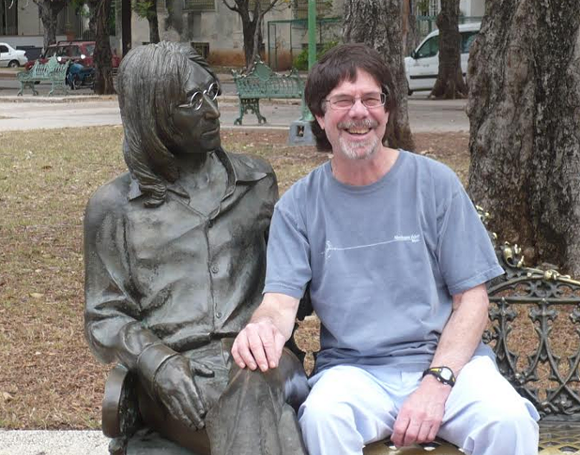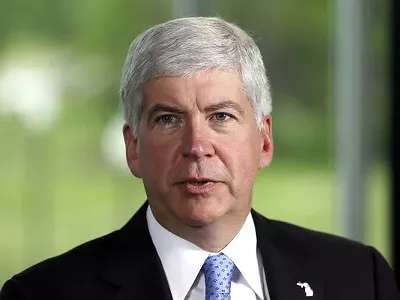
Audio By Carbonatix
[
{
"name": "GPT - Leaderboard - Inline - Content",
"component": "35519556",
"insertPoint": "5th",
"startingPoint": "3",
"requiredCountToDisplay": "3",
"maxInsertions": 100,
"adList": [
{
"adPreset": "LeaderboardInline"
}
]
}
]

Photo courtesy Peter Werbe
Peter Werbe poses in Havana at John Lennon Park.
On Halloween, Nightcall radio host Peter Werbe announced that his program, commercial radio’s longest-running live call-in talk show, had came to an abrupt end. The show, which had run for 46 years, went off the air without fanfare, and Werbe, perhaps commercial radio’s only self-identified anarchist, atheist, vegetarian host, had to use the program’s Facebook page to say goodbye.
Given his prominence as a voice for progressive political views and his involvement with Detroit’s Fifth Estate magazine, Werbe has long been a sort of fellow traveler to Metro Times. In the 1990s, he transcribed some of his interviews with left, anti-racist, and anti-authoritarian figures and MT ran them.
And so it doesn’t seem quite right that, in a year that had so many cultural losses, the demise of Nightcall should pass without mention. Hence, ending 2016 with our “exit interview” with Werbe.
These days, Werbe freely gives his age, 76, saying he’s “come out of the closet” regarding his status as a senior citizen. But in conversations with him over the last month, we’ve found that he hasn’t slowed down, and he keeps up a fast-paced patter in the same honeyed voice that won him that lifelong career in radio.
Metro Times: So, 46 years! What a run, huh?
Peter Werbe: Oh, there were some “interregnums” in there too. But I originally took over from Harvey Oshinsky in 1970. Harvey put together a show called Spare Change, and then he left to become the news director at WABX and Dick Kernen, now from the Specs Howard School of Broadcasting, asked me if I wanted to do it. In fact, it was WXYZ-FM at the time and they had no relevance whatsoever. Everybody was listening to WABX. And they came to the Fifth Estate, which was then a weekly newspaper. And we had these different columns, like Youth News and Women's News and Labor News and they actually slotted a number of Fifth Estate staff people into giving these little radical reports. And they said to me, “Hey, how would you like to do some interviews with people?” And I said, “Sure.” It was odd: These mainstream commercial broadcast enterprises fostering these left-wing programs, and one that turns out to be the longest-running phone-in talk show in American radio history.
MT: Didn't Frank Zappa say something like the executives of the 1960s were a bunch of cigar-chomping guys, but at least they said, “Will it sell? I don't know. Put it out there!”
Werbe: Yeah, probably true. Well, it flipped too. Then, the management was all conservative and all the DJs were long-haired wild radicals like me — and now it's reversed. You'll mostly find liberals in the management, and for some reason or other these DJs seem to be conservative, which I never could quite understand. Because obviously the arts in general tends toward the left, and certainly rock and roll. I mean you've got some Ted Nugents, but they're in such a minority.
MT: I would hope that for every Ted Nugent, there are 10 or 15 sex, drugs, and rock 'n' roll radicals.
Werbe: Yeah, that's what I mean. I mean there are Hollywood actors who are right-wingers, and what have you, but in the arts, because it depends on a sense of autonomy and freedom and freedom of expression that it comes out as supporting the left. The right wing, what do they always want to do? That's the clampdown. Although, you know, something like rock and roll is popular music, so you have every conservative politician having some rock song as a theme, even though these artists are always saying, “Would you stop playing our music please?” And what would it mean if you were a politician and you were promising, what, a chicken in every pot or two cars in every garage, why would you pick one that says “You Can't Always Get What You Want”? And that was what Trump did. What did that mean?
MT: It's sort of strange, the timing of the show ending right around the beginning of “the Trump Era.” What happened? Is this just something they've been wanting to do for a long time? Was it political? Was it economic? What?
Werbe: Well, I wish I could give you a real sexy story that I was repressed because of my left-wing views, but the company that I worked for, Greater Media Inc., which had headquarters in Boston and owned a number of properties around the country — including WRIF and WCSX and WMGC in Detroit — was sold to a company called Beasley Communications from North Carolina, and Oct. 31 was the last day Greater Media owned it, and, as part of the selling package, myself and a number of other people were discharged, as were people all across the properties owned by Greater Media. I mean, I'd be screaming up and down if I thought this was political, but it really wasn't, and Greater Media and all the general managers always supported me. Sometimes they would get so many complaints. Around 9/11, they insisted that I do the show that Sunday following that Tuesday. They couldn't have been better. So it's not a very sexy story. It's just about media consolidation. Remember, this is a commercial chain, and they're required, as holders of a public license, to provide public affairs broadcasting. And that was my official title: I was the public affairs director for the Detroit Greater Media Stations, and I provided the content other than the rock and roll formats. Well, it used to be the FCC would demand great amounts of programming, and it has diminished over the years to where it's next to nothing. You can put a few PSAs on the air and they're satisfied. So they looked at me and said, “Well, here's another salary we don't need in the new scheme of things.” So it was purely a business decision. You know, one doesn't want to say, “It's OK to fire me,” but it actually was not a prejudicial or political or repressive move at all, but, as the Godfather said, “It's only business.”
MT: [laughs] And you'd know what a protest to get you off the air would look like, right? You've been there before.
Werbe: That is interesting. About 30 years ago, when the company was bought by Great American, a new general manager came in and said, “We have rock ’n’ roll formats on WRIF. Why do we have a talk show? Why do we have Breakfast with the Beatles and stuff like that?” — and they broomed them all. And some people, without my intervention at all, organized a picket line of about 100 people, and they had signs saying, “No Werbe, No WRIF” — which I'm sure was an amazing stretch: You can fool yourself into thinking how indispensable you are, but anybody that's been in media knows that you're gone and people remember you fondly but go on without you.
MT: Is there something about people from Detroit that makes them more antagonistic to power? I’ve always thought so.
Werbe: [laughs] Well, you know, every city thinks it has special qualities that elevate it over the others, but I think Detroit does. I mean, just the nature of the city, the demographics of it, the industry that came and left, but when you think about the UAW and the civil rights movement, Martin Luther King Jr. gave his first "I have a dream" speech here in June of 1963. It’s a focal point for so much: the Detroit rebellion of 1967, the big one, you know? I don’t know whether I’m just being a Detroit chauvinist, but it does seem that we have an edge up on a lot of other cities.
MT: Your show went through so many great high points for the left, the resignation of Nixon, Reagan being shamed toward the end of his administration … Like, what are the “Greatest Hits of Nightcall”?
Werbe: I’m always fearful that when people ask me about who the most interesting guests were, or what the high point of it was, that it’s difficult for me to really pinpoint It was such a unique opportunity because there never was another show and there isn’t today, in commercial radio, like the one that I’ve had. And it was just an accident of time as people came in hired in by Dick Kernen and let loose on the air. I mean, who would have thought that I and the program would became this institution?
I remember when J. Edgar Hoover died, I played “Ding Dong the Witch is Dead,” which is the only time I ever got any negative feedback from the management.
All through the partisan left conversation that I’ve put out, they never said, “You’re being too radical!” or “You’re being too left.” If you can imagine a commercial station where the host says I’m an anarchist, atheist vegetarian and not being off the air in the next day, it is truly amazing. So I bear no animosity for the end of it. Sure, it would have been nice to have been on the last couple weeks, but — high points? I dunno: I interviewed people like Frank Zappa and Jackson Browne and that’s always when people go, “Whoa, that must have been cool.” But, ya know, prominent people never impress me that much. Some do, because of what they do in the world, or their ability to speak for certain ideas, but I can look back on people that talked about gender and race, and in fact, there’s an African American historian named Gerald Horne who has written such incredible revealing accounts of American history that I would put that over any of the conversations I had with [more] prominent people.
MT: Were there any point where you feel what you were doing with Nightcall you were able to have an effect on things in some way?
Werbe: When you’re sitting there in front of a microphone you don’t know if there’s five people or 500,000 listening. The program was streamed, and I’ve gotten emails from all around the world: Norway, Finland, South Korea, Mexico, Tasmania, from people that are listening. I don’t know why anybody in Tasmania would be interested in a talk show from Detroit, but they wrote. And when I announced on the Nightcall Facebook page that the program was ending, there were 20,000 reaches for it. And usually I thought it was pretty good if I got 600 or 1,000. And people wrote in saying that what I said changed their whole political views or they never had any until they saw this or they never got involved in the political or activist process until they heard my program. I was humbled by it, literally.
So, yeah, the response has been extraordinarily rewarding and made me understand that yeah I had a lot of influence on people. But I hope the biggest influence was that they thought for themselves.
MT: Well, they won’t find it anywhere else on commercial radio now.
Werbe: You don't hear what I have to say on any other commercial radio station in the country. And I'm not bragging: This says very little about me and quite a bit about commercial radio. You have college stations, community stations, or Pacifica stations that have blatantly partisan left-wing hosts, but not on commercial radio. I'm not very much into things commercial, other than it paid my salary for a long time and I loved the outlet and the folks that I talked to, but for all I know I was insulting half of the WRIF listeners. And that's probably not good business. So now maybe they'll be back to interviewing representatives of the Histoplasmosis Foundation, or something like that.
MT: [laughs] Of course, there have been a lot of changes in the tone of radio itself. I still remember the magic of these voices floating over the air, the intimacy you’d feel when people like Alan Almond or the Electrifying Mojo were talking to you. Now it just seems like radio is full of yammering back and forth.
Werbe: Well, one of the things that right-wing talk radio has done and the purpose it served all along was to give an affirmation of ideas that were outside of the mainstream. I don’t know whether they’ve been mainstreamed now with the election of Trump, but if you listen to some of the big stars of right-wing radio, it allowed particularly angry white men to vent against people of color, women, and gays. And because the dominant social narrative for a long time has been increasingly of tolerance and inclusion, these angry white guys don’t want this and they know they found a place where they can have their essentially mean-spirited ideas affirmed by allowing that to come out. … I’m not sure it’s the best thing. It’s like when you read the comments in The Detroit News: It could be an article about the recent “supermoon,” and the people are like, “Wow! Yeah, I saw it. It was great!” — and then, all of a sudden, you’ll see somebody — this literally happened — they’ll say. “Well, I’ll bet Kwame is seeing it from his jail cell” — and then they’re all off on black people. … Where before these people didn’t have a forum, you know, they didn’t have anywhere they could go, but between the internet news sites and right-wing talk radio there’s a legitimacy and an affirmation for ideas that a lot of us thought around issues that we thought had been resolved — but I guess with this election, there they all are again.
MT: With the younger generation as much more tolerant, inclusive, not to mention multiracial, than ever before, I don’t see how the heck you can have a hard right-wing administration … isn’t this just the bigots about to die off trying to engrave their bigotries in stone?
Werbe: Sure. It’s Rhodesia. [laughs] It’s the white population trying to hang on to an untenable situation and position. Just the other day was the day in 1967, on Star Trek, Captain Kirk kissed Uhura. And now if you are 21, and were born in 1995, you grew up with men kissing on television, interracial couples, so it’s the norm, it’s the cultural norm. And in many ways the election was about what social narrative was going to be dominant and the majority of people voted for inclusion and tolerance. It just happened that this slave colony institution of the Electoral College gives it to the second-place finisher, which is rather strange but that’s what happened.
So, yes, I agree with you. But even a wounded dragon flailing its tail can do a lot of damage.
MT: In fact, in many ways your show was an outlet for a lot of the stuff that didn’t get a proper airing in the mainstream media. I know recently we had a discussion about the mainstream news not showing the confrontation at Standing Rock.
Werbe: I think there may have been a little blip: A line that the demonstrators or protestors at Standing Rock clashed with police — and I hope people know by now that when they see “clashed” it means that robocops kicked the crap out of unarmed protesters.
MT: One of the things that has really changed radio and other mass media was the 1996 Telecom Bill. Can you speak to what happened there?
Werbe: Well, yeah. It opened the floodgates, didn't it? And so you had that consolidation. Now you have engineers that used to belong to IBEW or NABET and part of their duties are to shovel the snow. That doesn't even sound odd anymore.
MT: There have been lots of changes with working people's attitudes. I can't remember who said it, but you know the type of worker: one who'd rather have three teeth in his head than a union dental card in his pocket?
Werbe: [laughs] I worked for the UAW 2000-2003 and they were concerned then about union guys who would vote Republican, and why were they voting: They were strong Catholics, they were voting against abortion, they were afraid that Gore was going to take away their guns, the same thing. And you say to these guys, “But they want to destroy your union!” and they never have a coherent answer.
I saw someone at the RNC this year, a guy with a T-shirt that said “Teamsters for Trump” — and I said, “This guy wants to get rid of all the unions. How can you support this?” I can’t recall exactly what he said.
Now, I agree that unions most unions they rise to the level of “better than a stick in the eye” but the Republicans are a stick in the eye. And the reason [some unions fall short]: All institutions tend toward bureaucratization and some of them as we know even become rackets — but frequently it’s because of lack of member participation. I mean, I would go to my union meetings and there’d be eight or nine people out of several hundred in the area that would come. They treated it like it was the cleaners: They pay their fee and they expected the people in charge to do the work for them — to represent them, to get them better wages and benefits. But a lot of times what would happen is these union guys figure, “Fuck it: Why shouldn’t I have a Lincoln and park it up on the sidewalk? Why shouldn’t I have a $1,000 suit and eat at Carl’s Chop House?”
MT: They see themselves as junior management?
Werbe: Yeah. You know the old United Electrical Workers still exists and they have a rule that no officer can make more than the highest-paid worker in the industry. Meanwhile, you can find UAW officials living in Indian Village and Pleasant Ridge, and the people paying their wages are living in Southgate. Randi Weingarten, head of the American Federation of Teachers, takes home more than $500,000 a year. I mean, that is an absolute disgrace. Between the top officers they’re probably making $1 million and I’m thinking, “How many organizers could you hire for that?”
MT: As an older guy, what are your thoughts on the millennial generation?
Millennial generation?
Werbe: [laughs] I can’t even formulate an answer. One hopes, one is told, that they’ve shed the prejudices and attitudes of the generations before them — but if you look at those Trump crowds, there are millennials in there all just wild for this dangerously ignorant man who’s encouraging intolerance. So they’re holding on, I guess. When you see them at their best, it gives you hope. But when you look at a Trump rally, it’s depressing. That jubilance at those rallies isn’t about policy. I think it was a referendum on whether black and brown lives matter, and to most white people they don’t. Think about when Trump says he’d bring back waterboarding “and worse” and there’s this roar of approval from the crowd — that’s frightening.
MT: Why should we embrace hope and reject despair?
Werbe: I’ve always been of two minds: of hope and despair simultaneously. Sometimes even at the height of the greatest resistance, if somebody says, “Do you think we have the power to overcome this?” I think: I don’t know. People have been so domesticated by the definitions of this society that having the capacity to burst beyond it doesn’t seem like it has the greatest of chances. On the other hand just when something simple and nothing very radical or revolutionary, like a march of 1,200 people in Ferndale for "Ferndale Trumps Hate" and you’re there with 1,199 people and you don’t know anybody except 20 people but you feel this human solidarity — that’s the quality that brings hope.
Then again, in the late 1930s in Detroit, that’s when it was the beginning of the very powerful demand for black rights, the union movement, and all of that — and at the same time there was Father Coughlin and the Black Legion. So maybe hope and despair are together all the time. I am always going to act on hope. If I’m at my most hopeful and somebody says, “Do you think we’re really gonna win?” I’d say, “God, I wish you wouldn’t have asked me that!”
MT: Why should people keep on fighting?
Werbe: On Nightcall, when Juline and I would say we were going to be at a demonstration and ask people to join us, one of the things I’d say is: It is not enough in your brain to think “I have not been fooled by these people in power” and hence I’m not a tool. I’ve emotionally resisted their efforts to dominate me. Haha!” well, one of the things is that words like demonstration means people being out in the street, but it “demonstrates” your belief, and nobody can hear what’s inside your head, so I would say get out there, take part in everything, and that’s one of the things my wife and I try to do, to go to as many events as possible, and after a while you see your friends there. I don’t mean to say that disparagingly — the usual suspects — but if you look back in history, when communities of resistance become really developed, they have theater, they have art, they have filmmakers, everything under the sun comes together as part of a rich experience. Rather than being an object of history, something that’s moved, you become the subject, you are making the history, creating your own life and the life of the community.





